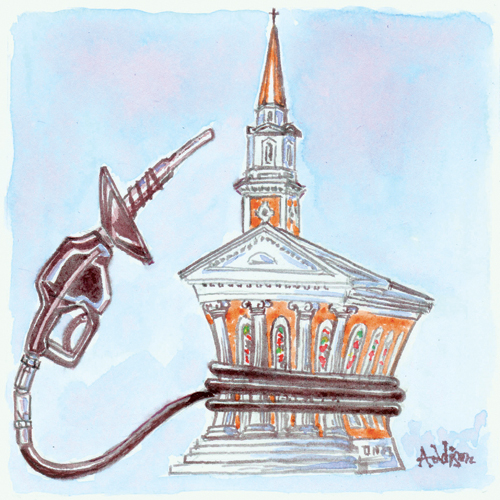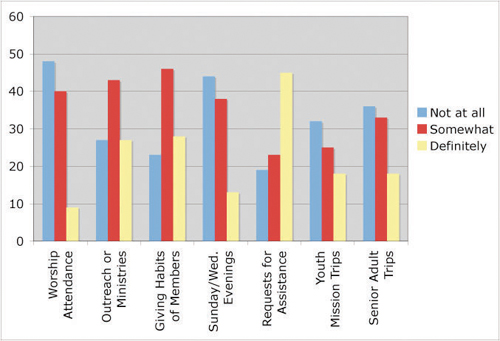Early reports are confirmed: “A majority of our church members are experiencing increases in living costs without increases in income, so some are choosing to ‘pass it on’ by reducing their giving or attending.”

That assessment, made by one survey respondent, expresses the sentiments of one in four church leaders who believe the “squeeze” felt at the gas pump is definitely affecting their outreach or ministries and influencing the giving habits of members. When combined with those who indicated that they feel their ministries and giving habits have been somewhat impacted, the totals surpass more than three-quarters of the 160-plus respondents to a June survey conducted by The Baptist Courier.
More specifically, gas prices, which surpassed $4 nationwide during the July 4 weekend, are affecting “the ability of the pastor to do hospital and nursing home visitation,” noted Randall Runion of Switzer First Baptist Church in Moore.
“I am more aware of the expenses of the visits I need to make on a given day, so I am very careful to plan them close together,” agreed pastor Ronnie Boone of Friendship Baptist Church, Lancaster.
Awareness of the continuing rise in travel expenses has led some churches to consider adjusting their budgets to add money for gas reimbursements for staff members.
But pastors, obviously, are not the only ones being affected. Jamie Rogers of Kershaw’s Second Baptist Church has observed “a general uneasiness and fear in the mindset of church members.”
Although 44 percent felt attendance on Sunday and Wednesday evenings had not been affected so far, “for members who live 20 or more miles from the church building, regular attendance could become more of a problem as prices continue to increase,” remarked Joyce Peine of Charleston’s Southside Baptist Church.
To reduce its expenses, Ridge Baptist Church, Summerville, may curtail some meetings to offset heating and cooling costs, said pastor Bobby Eubanks.
Ridgeland Drive Baptist Church, Six Mile, is considering “combining meeting times for committees, so that trips to and from the church building can be minimized,” reported Tom Jones, interim pastor.
Some are even temporarily suspending Sunday night services.
One unidentified respondent said that the increase in inflation has caused his church to allow the pastor to become bivocational in order to find other employment so that he can better care for his family.
Yet, in spite of the hardships, some church members are discovering creative opportunities for outreach:
“Each church should take a survey and decide if maybe a car pool would be beneficial,” suggested Jo Quesenberry of New Salem Baptist Church, Sumter. By taking turns driving, people could “share the ride for Christ,” she said. “This could be a way of helping others out of an unfortunate situation, and something good can come out of it.”
Wayne Hunter, pastor of Hillcrest Baptist Church, Dalzell, said that some members are purchasing Wal-Mart gas cards to “leave a dollar or two for our neighbors at the pump.” With the cards, they place an “act of kindness done by Hillcrest” note in case someone comes to the pump on “a wing and a prayer,” he explained. “We’ve seen several put in a dollar’s worth of gas just to make it home,” he said.
Still others feel members are becoming more sensitive to the needs of others. “There is a greater sensitivity to the elderly and for the families who come to our food ministry,” said pastor Roger Plemmons of Calvary First Baptist Church, Greenville.
“Since we have a big outreach for the poverty-stricken in our area, members have been digging deeper to help support the ministry,” commented Sue Higham of Crescent Hill Baptist Church, Columbia.
In other significant findings:
? 43 percent felt youth mission trips, and 41 percent felt senior adult activities, were being negatively impacted.

“We have a youth ministry to trailer parks around Shaw Air Force Base, and we’ve had to limit the number of activities they do and the distance they will travel. More activities are done in state this year, not out of state,” said Hunter.
In addition to driving church buses less often, some – like Port Royal Baptist Church – are deciding to take shorter camp and missions trips, while others – like Washington Baptist Church, Greer – are asking group participants to pitch in to help offset transportation costs for non-essential, fellowship outings and pleasure trips.
? 45 percent reported a definite rise in the frequency of requests for financial assistance, and 23 percent more have somewhat noticed an increase.
“I’ve been to several churches who have food pantries in which they are seeing new people and families seeking assistance within and outside the church community,” one survey respondent observed.
Among the unexpected benefits of the high gas prices, however, some have begun to see more earnest prayer for our nation’s economy and the possibility of higher service attendance during summer months because many are not able to take long vacations.
Denise Elliott of Mount Olive Baptist Church, Nichols, observed that to conserve energy and save money, people are spending more time at home.
“This is good for families who enjoy being together. They seem to have more time for each other instead of running up and down the road separately,” Elliott said.
Still, the general consensus of church leaders seems to agree with the sentiment of one survey respondent: “I think that gas prices need to lower. People can’t go on but so long like this.”
Editor’s note: Special thanks to Tom Crites of the Georgia Baptist Convention’s research department for assistance in creating the online survey.
